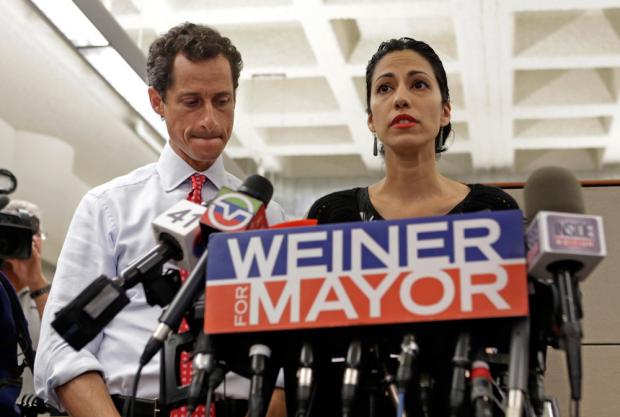No Second Acts: Weiner
Go ahead, make jokes, It’s hard not to. In fact, it’s just about impossible not to. When I notified my editor the other day that my review of the new documentary Weiner “won’t be very long,” I wasn’t trying to make a joke. But there it is anyway.
If Anthony Weiner was sensitive about his name, he should never have run for public office—he was elected to Congress seven times in a district representing parts of Brooklyn and Queens. When your home town newspapers include the New York Post and Daily News, whose daily covers invented the art that migrated to the internet and called itself clickbaiting, you know they won’t pass up a single chance to work the name.
But rise above it he did. Weiner first came to national attention on the floor of Congress, angrily telling off Republicans who blocked a bill to provide medical care for 911 responders. (It was tied to a corporate tax increase.) That pugnacious style made Weiner, at the time in his 40s, a rising star among liberal Democrats, one whose career might even have eclipsed his mentor, Senator Chuck Schumer.
Until…
Over time, we may forget the exact nature of the scandals that drove other politicians from office. Anthony Weiner will never benefit from that fading of the public memory. A permanent reminder of his scandal is right there in his name. As the quote from Marshall McLuhan that opens the film puts it, “The name of a man is a numbing blow from which he never recovers.”
(For anyone reading this who doesn’t know what Weiner did, all of us at The Public would like to tell you how thrilled we are that, having apparently ignored all other forms of mass media for at least the past decade, you chose to pick up our humble publication.)
Weiner resigned from Congress in 2011. Two years later, having repaired his marriage and kept out of the public eye, he decided to run for mayor of New York. Surely the people of New York were tough nuts who by this point could laugh at his misdeeds and set them aside in favor of his real strengths as a politician. He agreed to let his former aide Josh Kriegman and his partner Elyse Steinberg shoot a film about the campaign, giving them what appears to be nearly unlimited access. A comeback seemed well under way.
Until he did it again.
It is to his credit that Weiner let the cameras keep rolling even after the second scandal broke. You have to believe that he truly believes he can do some good for the people of New York: as he says to one questioner at a public meeting, why else would I come out here and have to face the same questions over and over again?
Kriegman and Steinberg don’t try to psychoanalyze their subject. They don’t dig into his past to probe his motivations. They don’t wonder if the bad habits that got him into trouble may have existed for years (he was a bachelor until he married Huma Abedin in 2010).
You may well watch this movie and think, “Serves him right.” Or maybe, “Well, what did he expect?” But you’ll probably also come away discouraged about the state of both politicking and the mass media in our times. As Weiner tells the filmmakers in a post-mortem interview, ““It’s hard to believe my whole life has been engulfed by this thing. It’s kind of like, ‘Besides that, Mrs. Lincoln, how was the show?’”

